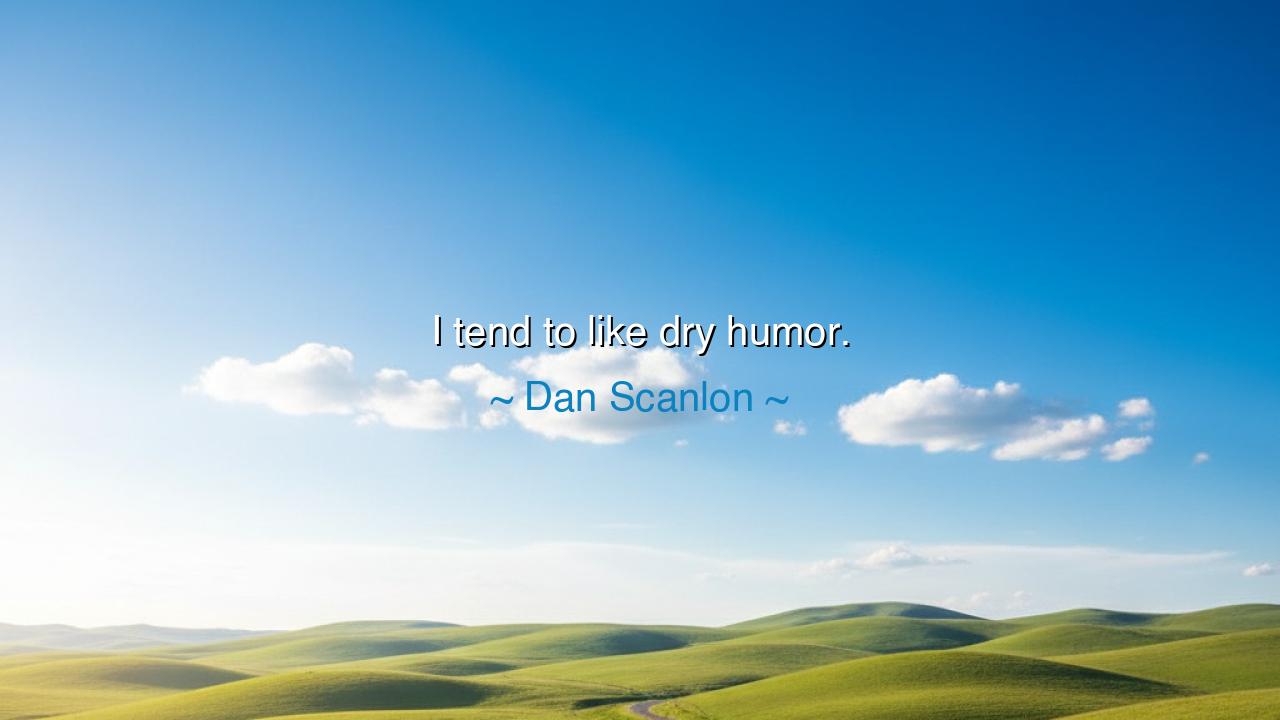
I tend to like dry humor.






In the universe of humor, where laughter is born from the smallest gestures and the most profound truths, there exists a distinct form of wit—a humor that does not announce itself with a loud burst but rather creeps upon the soul, leaving the listener to pause, reflect, and, if they are wise, to smile. Dan Scanlon, in his simplicity, reveals a timeless truth when he says, "I tend to like dry humor." This humble preference for a more subtle and reserved form of humor carries with it an ancient wisdom—one that speaks to the power of understatement, the beauty of restraint, and the ability to deliver the sharpest truths through the quietest of words.
In the ancient world, humor was often seen as a means of revealing not just the absurdities of life, but the deeper truths that lay beneath the surface. Take for example the works of Socrates, whose famous method of questioning, known as the Socratic method, often employed irony and subtle humor to expose the limitations of human knowledge. Socrates’ humor was not overt; it did not aim for loud laughter or obvious comedy. Instead, it was a dry humor that used questions to lead others to the realization that their understanding of the world was, in fact, deeply flawed. In this sense, Scanlon’s preference for dry humor reflects a deeper philosophical approach—a kind of humor that reveals truths not through obvious jest, but through quiet observation and reflection.
The ancient tradition of comedy also contains echoes of this subtle wit. Aristophanes, one of the great comedic writers of ancient Greece, filled his works with sharp satire and bold criticism of his society. Yet, there were moments in his plays where the humor was not loud or raucous, but rather dry—an irony that took the audience by surprise, making them reflect deeply on the absurdities of their own lives and the world around them. Just as Aristophanes used dry humor to reveal the truths of his time, Scanlon embraces this form of humor to explore the truths of the human experience—ones that are not easily understood, but that resonate deeply once we pause to reflect upon them.
Dry humor, in its most powerful form, is a tool for clarity. It does not overwhelm the senses with exaggerated gestures or loud jokes, but instead speaks directly to the heart and mind of the listener. Consider the ancient epic of Homer, where the great warriors, such as Achilles and Odysseus, faced their own struggles and tragic flaws with a form of humor that was deeply ironic and reflective. Their humor was not meant to entertain or distract, but to illuminate their own faults and the complexities of their journeys. In the same way, Scanlon’s dry humor invites us to reflect on the subtle moments of life, where the most profound truths are revealed not through shouting but through a whisper of understanding.
In a world where humor often tends to be loud and over-the-top, the quiet force of dry humor serves as a powerful reminder that the most valuable insights are not always the most obvious. The humor of ancient philosophers like Diogenes, who would often mock the excesses of society with a quiet gesture or a single, pointed remark, serves as a reminder that the greatest truths are often found in the smallest, most reserved moments. Similarly, Scanlon’s preference for dry humor calls us to appreciate the power of restraint—to see the value in moments of silence and reflection, and to recognize that laughter does not always need to be loud to be meaningful.
The lesson embedded in Scanlon’s words is one of restraint and introspection. Dry humor, like the most profound insights of the ancients, does not seek to be loud or obvious, but instead invites the listener to pause, reflect, and discover the deeper truths hidden within the quiet corners of life. It teaches us that wisdom is not always found in the most forceful expressions, but in the moments where we take a step back and consider the world with a calm gaze. Whether in humor or in life itself, we must learn to appreciate the subtle, the quiet, and the understated—not as a form of avoidance, but as a means of embracing the complexities of the human experience.
In our own lives, let us adopt this wisdom. Let us learn to see the power of dry humor—not as an escape from life’s challenges, but as a way of illuminating them. By embracing the quiet humor of restraint, we can find the strength to navigate even the most difficult of times with grace and clarity. In doing so, we honor not only the humor of Dan Scanlon, but the profound tradition of those who understood that sometimes, the most important truths are delivered not with a loud roar, but with a gentle whisper that resonates in the heart for a lifetime.






AAdministratorAdministrator
Welcome, honored guests. Please leave a comment, we will respond soon